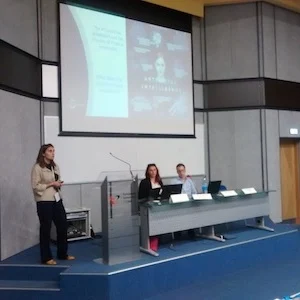Education is the linchpin to creating a culture of trust where patients feel comfortable engaging fully with mHealth. Healthcare staff need to be up to the task with finely-honed digital skills.
These were the key take away messages at the session on digital transformation held at the International Congress of Health Workforce Education & Research (INHWE) held in Nicosia, Cyprus in early May.
Under the theme of Future Education for Healthcare, the two-day congress brought together delegates from 20 countries that presented on subjects that included training for workforce planning, culturally sensitive care and healthcare policy.
You might also like: Digital Health Hub at your service - if you earn citizen trust
Dr. Eszter Kovács, Assistant Professor at Semmelweis University led a panel of speakers from across the European HIT world to present the roadblocks to effective healthcare digital transformation and present research which is tackling the issue of HIT staff skills.
The session opened with a tele-presentation by Luís Velez Lapão, Professor of International Public Health at Institute of Hygiene and Tropical Medicine at Lisbon’s Nova University.
He spoke of how urgent it is for healthcare digital training to face the challenges of the sector. “We need to focus on people, processes and technology,” he said. “We need to understand technology very well to use it properly and innovation is very important.”
“Changing skills and attitudes is a long process so we need to start now,” said PéterSzegner, Researcher at Semmelweis University in Hungary on the reticence both patients and staff feel in engaging with digital health.
Szegner went on to speak about the reluctance of patients to share data owing to security issues or lack of digital skills. Pilots show elderly patients in particular are motivated to engage with digital health when there’s a necessity, he said.
mHealth is booming but patient compliance hasn’t automatically followed. Even digital-savvy younger generations have been slow on the uptake when it comes to engaging with apps for healthcare purposes.
The lag between healthcare digitalisation and staff engagement is on-going but one is gradually being addressed across Europe at a research and training level. Annick Ducher, of EIT Health, a body that promotes innovation and growth in healthcare, presented details about an on-going study into personnel digital skills that will bear fruit later this year. Linda Keane of the ICS Foundationin Dublin, an organisation supporting ICT education, spoke about a developing training and feedback roadmap.
A growing
ageing population, rising patient mobilityand a steady drop in the number of
healthcare personnel mean that digital solutions in the form AI applications
and data leverage are increasingly necessary to ensure smoothly-running health
systems across Europe. Scandinavian states show some of the highest successes in onboarding digitalistion and gaining patient trust for data use.
INHWE is a membership organisation that brings together healthcare educators and researchers from all disciplines with an aim to improve the education and training provided to health workforce professionals across the globe.
Source: HealthManagement.org
Image credit: HealthManagement.org






